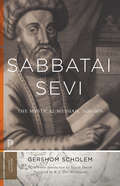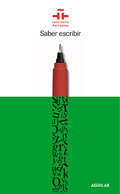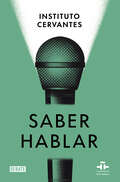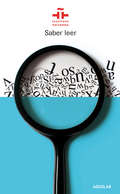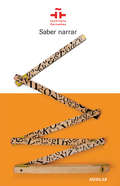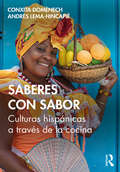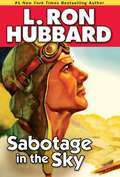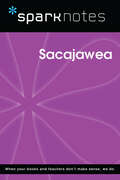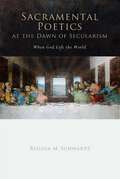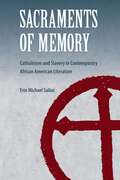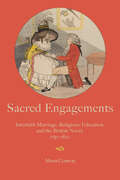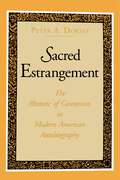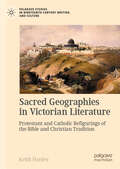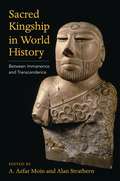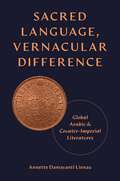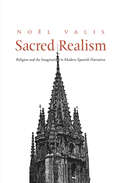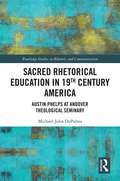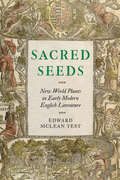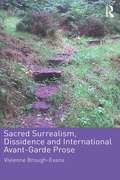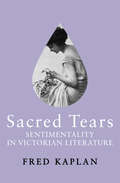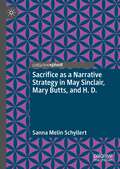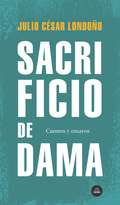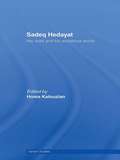- Table View
- List View
Sabbatai Ṣevi: The Mystical Messiah, 1626-1676
by Gershom Scholem Yaacob Dweck R. J. WerblowskyGershom Scholem stands out among modern thinkers for the richness and power of his historical imagination. A work widely esteemed as his magnum opus, Sabbatai Ṣevi offers a vividly detailed account of the only messianic movement ever to engulf the entire Jewish world. Sabbatai Ṣevi was an obscure kabbalist rabbi of seventeenth-century Turkey who aroused a fervent following that spread over the Jewish world after he declared himself to be the Messiah. The movement suffered a severe blow when Ṣevi was forced to convert to Islam, but a clandestine sect survived. A monumental and revisionary work of Jewish historiography, Sabbatai Ṣevi details Ṣevi's rise to prominence and stands out for its combination of philological and empirical authority and passion. This edition contains a new introduction by Yaacob Dweck that explains the scholarly importance of Scholem's work to a new generation of readers.
Saber escribir
by Instituto CervantesLas pautas que necesitas para aprender a escribir mejor. Saber escribir expone con claridad, amenidad y rigor las pautas necesarias para escribir lo que pensamos y decimos. ¿Sabe escribir un informe, una carta, el acta de una reunión o un proyecto? ¿Sabe cómo tomar apuntes, contestar a una pregunta de examen o preparar su currículum? ¿Sabe redactar una carta de reclamación, presentar una instancia, dirigirse a la Administración o componer una invitación? Saber escribir no es un manual de estilo o de corrección gramatical ni un diccionario de dudas; no es un manual de creación literaria, aunque enseñe técnicas y recursos de escritura que aparecen en los textos literarios. Es todo lo anterior, y más. Es otro concepto de manual. Es un instrumento imprescindible para los que dudan, para los que tienen pánico a la página o a la pantalla en blanco, para los que tienen necesidad de escribir, en definitiva. Saber escribir expone con claridad, amenidad y rigor las pautas necesarias para escribir lo que pensamos y decimos. Nace con la intención de ayudar a redactar; de ampliar los procedimientos de generación y precisión de ideas, de documentación y de planificación; de seleccionar los elementos de unión adecuados; de relacionar de forma conveniente el contenido del tema con la expresión, el registro y el estilo elegidos, y de aprender a aplicar las técnicas de revisión y corrección para lograr la redacción y la disposición exigidas en cualquier presentación escrita.
Saber hablar
by Instituto CervantesSaber hablar explica con claridad, amenidad y rigor las pautas necesarias para expresar lo que pensamos; facilita la comunicación entre los seres; amplía los procedimientos de generación y precisión de ideas, de documentación y de planificación. Vivimos rodeados de palabras, inmersos en un tráfico constante de expresiones en un mundo que es diálogo por naturaleza. ¿Alguna vez se ha parado a pensar en el poder que le confiere el habla? Un buen discurso es la clave del éxito. Saber hablar reivindica el arte de la comunicación oral, motor de las relaciones interpersonales, sociales, económicas y profesionales, en un tiempo donde impera el dominio del verbo. Hoy más que nunca saber hablar bien es una necesidad. Este libro ofrece la posibilidad de emplear el habla de manera adecuada según el momento y la situación, que pueden ser formales -la consulta del médico, el rectorado de la universidad, una entrevista de trabajo, una junta de vecinos, una exposición comercial- o coloquiales -la familia o los amigos-.
Saber hablar
by Instituto Cervantes Marta Albelda Marco Salvador Pons BorderíaNueva edición revisada y actualizada de un clásico español sobre la comunicación oral Vivimos rodeados de palabras, inmersos en un tráfico constante de expresiones que se producen en un mundo que es diálogo por naturaleza. Sin embargo, pocas veces nos detenemos a pensar en el poder que nos confiere el habla. Un buen discurso es la clave del éxito. Saber hablar es, desde su primera publicación en 2008, un referente entre los libros sobre comunicación oral, concebida esta como motor de las relaciones interpersonales, sociales, económicas y profesionales, en un tiempo en el que impera el dominio de la palabra. Este libro, que ahora se presenta en una edición revisada, actualizada y ampliada, ofrece la posibilidad de emplear el habla de manera adecuada según el momento y la situación, ya sea esta formal -la consulta del médico, el rectorado de una universidad, una entrevista de trabajo, una junta de vecinos, una exposición comercial- o coloquial -un encuentro con la familia o los amigos-, y según se utilice en un ámbito reducido o público y por canales presenciales o virtuales, tan extendidos en los últimos tiempos. Saber hablar explica con claridad, amenidad y rigor las pautas necesarias para expresar lo que pensamos; facilita la comunicación entre las personas, y da pautas para enriquecer los procedimientos de generación de ideas y para expresarlas con una mayor precisión y riqueza.
Saber leer
by Instituto CervantesSaber leer se ha convertido en una habilidad imprescindible. Los formatos digitales traen consigo modos de lectura diferentes y desafían al lector a participar en nuevas estrategias en las que es protagonista. La educación recibida y la gran cantidad de comunicaciones escritas que se obtienen a diario en una sociedad globalizada no garantizan que los lectores sean capaces de interpretar los escritos de forma correcta. En su caso ¿está seguro de entender bien lo que lee? ¿Es capaz de recordar lo que ha leído y contarlo con otras palabras? ¿Podría sintetizar los puntos más importantes de un texto? Saber leer completa la trilogía iniciada con Saber escribir y Saber hablar: una obra divulgativa que se dirige a un público amplio, a personas interesadas en los procesos, en la comprensión y en el aprendizaje de la lectura. Gracias a ella aprenderemos las estrategias necesarias para enfrentarnos a todo tipo de textos, cómo desarrollar un pensamiento crítico a través de la lectura y la relación de ésta con la escritura, los procesos de comunicación, el aprendizaje y la memoria. Descubra en estas páginas cómo leer líneas y entrelíneas.
Saber narrar
by Instituto CervantesDescubra en estas páginas el arte de la narración periodística, literaria y cinematográfica. Saber comunicar captando la atención de un receptor es imprescindible en una sociedad como la nuestra en la que los medios de comunicación protagonizan nuestras vidas. Además, con los formatos digitales es habitual tener que enfrentarse a la temida hoja en blanco. ¿Cómo ordenamos lo que queremos decir? ¿Qué elementos debo introducir en el texto para que suscite el interés del lector? Si estoy en una reunión, ¿sabré expresar las ideas de un modo ordenado? Saber contar se ha convertido en una destreza imprescindible hoy día. Y hay tres ámbitos fundamentales para comunicarse: narrativa, periodismo y cine. Tres expertos en cada una de estas tres facetas nos darán las claves para poder empezar a narrar en clave periodística, en clave literaria y en clave cinematográfica. Saber narrar completa la colección iniciada con Saberescribir, Saber hablar y Saber leer. Una obra divulgativa que se dirige a un público amplio, a personas interesadas en los procesos narrativos y en el aprendizaje de los diferentes modos de expresión. Gracias a ella y de la mano de los expertos aprenderemos las estrategias necesarias para generar todo tipo de textos, y suscitar el interés por lo que se quiere contar, dentro de los procesos de comunicación, el aprendizaje y la memoria.
Saberes con sabor: Culturas hispánicas a través de la cocina
by Andrés Lema-Hincapié Conxita DomènechSaberes con sabor: Culturas hispánicas a través de la cocina es un manual avanzado que responde al creciente interés por el estudio de las prácticas culinarias y alimenticias de Ibero-América, sin desatender ni la lengua ni la cultura de esas regiones del mundo. Cada capítulo comprende aspectos vinculados con recetas, lengua, arte y teoría. Los estudiantes son expuestos a temas de geografía, historia, literatura, política, economía, religión, música e, incluso, cuestiones de género que estarían implicadas en la elaboración y en el consumo de ciertas comidas. Y, esto, mientras mejoran sus habilidades en temas esenciales y específicos del español. A lo largo del libro, están incorporados materiales de internet —como vínculos para videos, registros sonoros, referencias históricas, sitios web de cocina y contenidos suplementarios para la investigación. Muy útil en cursos universitarios, Saberes con sabor es un recurso original y único de aprendizaje para estudiantes fascinados por los placeres del paladar y, de igual manera, con una genuina pasión por las culturas hispánicas.
Sabotage in the Sky
by L. Ron HubbardLaunch into the action with this triumphant tale! Pilot Terry Lee has taught Bill Trevillian everything he knows about flying, enough that Bill's know considered the ace of American test pilots just as war breaks out in World War II Europe. Unknown to Bill, Terry's also taught his own kid sister, Kip, who's now almost as good a pilot as Bill and quite the looker to boot. When France and Great Britain must choose between different American plane designs to outfly the newest and deadliest Nazi fighters, the competing companies send their two best test pilots . . . Kip and Bill. Unfortunately, a spy also has been sent to infiltrate and sabotage the planes to make sure that neither the French nor British will consider them safe enough to fly. Soon Kip and Bill suspect the other of sabotage-- a problem that not only threatens their already electric relationship but their very lives. "Riveting cliff-hanger action." --Midwest Book Review
Sacajawea (SparkNotes Biography Guide)
by SparkNotesSacajawea (SparkNotes Biography Guide) Making the reading experience fun! SparkNotes Biography Guides examine the lives of historical luminaries, from Alexander the Great to Virginia Woolf. Each biography guide includes:An examination of the historical context in which the person lived A summary of the person&’s life and achievements A glossary of important terms, people, and events An in-depth look at the key epochs in the person&’s career Study questions and essay topics A review test Suggestions for further reading Whether you&’re a student of history or just a student cramming for a history exam, SparkNotes Biography guides are a reliable, thorough, and readable resource.
Sacramental Poetics at the Dawn of Secularism
by Regina SchwartzSacramental Poetics at the Dawn of Secularism asks what happened when the world was shaken by challenges to the sacred order as people had known it, an order that regulated both their actions and beliefs. When Reformers gave up the doctrine of transubstantiation (even as they held onto revised forms of the Eucharist), they lost a doctrine that infuses all materiality, spirituality, and signification with the presence of God. That presence guaranteed the cleansing of human fault, the establishment of justice, the success of communication, the possibility of union with God and another, and love. These longings were not lost but displaced, Schwartz argues, onto other cultural forms in a movement from ritual to the arts, from the sacrament to the sacramental. Investigating the relationship of the arts to the sacred, Schwartz returns to the primary meaning of "sacramental" as "sign making," noting that because the sign always points beyond itself, it participates in transcendence, and this evocation of transcendence, of mystery, is the work of a sacramental poetics.
Sacraments of Memory: Catholicism and Slavery in Contemporary African American Literature
by Erin Michael SaliusCatholic themes and imagery in the work of writers including Toni Morrison, Leon Forrest, Phyllis Alesia Perry, and Charles Johnson Sacraments of Memory is the first book to focus on Catholic themes and imagery in African American literature. Erin Michael Salius discovers striking elements of the religion in neo-slave narratives written by Toni Morrison, Leon Forrest, Phyllis Alesia Perry, and Charles Johnson, among others. Examining the emergence of this major literary genre following Vatican II and amidst the Black Power and civil rights movements, she uncovers the presence of Catholic rituals and mysteries—including references to the Eucharist, Augustinian theology, spirit possession, and stigmata. These textual references occur alongside and in tension with criticisms of the Church's political and social policies. Salius offers a nuanced reading of Beloved that interprets the novel in light of Toni Morrison's affiliation with the religion. She argues that Morrison, and the other novelists in this study, draw on a Catholic countertradition in American literature that resists Enlightenment rationality. She highlights allusions to Catholic tropes such as the connections between spirit possession and the hijacking of Jane's narrative voice in Ernest Gaines's The Autobiography of Miss Jane Pittman. Salius also identifies Augustinian theology on the prescience of God in the flash-forward narrative techniques used in Edward P. Jones's The Known World. These authors use Catholicism to challenge the historical realism of past slave autobiographies and the conventional story of American slavery. Ultimately, Salius contends that this tradition enables these novelists to imagine and express radically different ways of remembering the past. Publication of the paperback edition made possible by a Sustaining the Humanities through the American Rescue Plan grant from the National Endowment for the Humanities.
Sacred Engagements: Interfaith Marriage, Religious Toleration, and the British Novel, 1750–1820
by Alison ConwayA revelatory reading of the British novel that considers interfaith marriage, religious toleration, and the ethics of sociability.Bringing together feminist theory, novel criticism, and religious studies, Alison Conway's Sacred Engagements advances a postsecular reading of the novel that links religious tolerance and the eighteenth-century marriage plot. Conway explores the historical roots of the vexed questions that interfaith marriage continues to raise today. She argues that narrative wields the power to imagine conjugal and religious relations that support the embodied politics crucial to a communal, rather than state-sponsored, ethics of toleration.Conway studies the communal and gendered aspects of religious experience embedded in Samuel Richardson's account of interfaith marriage and liberalism's understandings of toleration in Sir Charles Grandison. In her readings of Frances Brooke, Elizabeth Inchbald, and Maria Edgeworth, Conway considers how women authors reframe the questions posed by Grandison, representing intimacy, authorship, and women's religious subjectivity in ways that challenge the social and political norms of Protestant British culture. She concludes with reflections on Jane Austen's Mansfield Park and the costs of a marriage plot that insists on religious conformity. By examining the complex epistemologies of the interfaith marriage plot, Sacred Engagements counters the secularization thesis that has long dominated eighteenth-century novel studies. In so doing, the book recognizes those subjects otherwise ignored by liberal political theory and extrapolates how a genuinely inclusive tolerance might be imagined in our own deeply divided times.
Sacred Estrangement: The Rhetoric of Conversion in Modern American Autobiography
by Peter A. DorseySacred Estrangement analyzes certain works by important American writers and thinkers in the context of the "rhetoric of conversion." Such analysis is especially valuable because it provides a reliable index of the relationship between the self and larger communities. Traditionally, "conversion" has served a socializing function, signifying that one has come into alignment with certain linguistic, behavioral, and cultural expectations. The socialization process is particularly apparent in the Christian conversion narratives of the seventeenth through nineteenth centuries: by publicly testifying to a conversion experience, believers became empowered members, not only of God's elect community but also of a local population. As modern autobiography developed in the eighteenth and nineteenth centuries, the Christian pattern was secularized and individualized. Conversion became a model for many kinds of psychological change. With the coming of the twentieth century, however, the authors upon whom Peter Dorsey focuses, including William and Henry James, Henry Adams, Edith Wharton, Ellen Glasgow, Zora Neale Hurston, and Richard Wright, radically revised conversion rhetoric. If conversion had traditionally linked the search for illumination with the search for a defined social role, these writers increasingly used conversion as an index of estrangement from mainstream America. Dorsey documents this profound change in the way American intellectuals defined the "self," not in terms of personal orientation toward or away from a given community, but as a resistance to such an orientation altogether, as if social forces by their "nature" were a threat to personal identity.
Sacred Estrangement: The Rhetoric of Conversion in Modern American Autobiography (G - Reference, Information and Interdisciplinary Subjects)
by Peter A. DorseySacred Estrangement analyzes certain works by important American writers and thinkers in the context of the "rhetoric of conversion." Such analysis is especially valuable because it provides a reliable index of the relationship between the self and larger communities. Traditionally, "conversion" has served a socializing function, signifying that one has come into alignment with certain linguistic, behavioral, and cultural expectations. The socialization process is particularly apparent in the Christian conversion narratives of the seventeenth through nineteenth centuries: by publicly testifying to a conversion experience, believers became empowered members, not only of God's elect community but also of a local population. As modern autobiography developed in the eighteenth and nineteenth centuries, the Christian pattern was secularized and individualized. Conversion became a model for many kinds of psychological change. With the coming of the twentieth century, however, the authors upon whom Peter Dorsey focuses, including William and Henry James, Henry Adams, Edith Wharton, Ellen Glasgow, Zora Neale Hurston, and Richard Wright, radically revised conversion rhetoric. If conversion had traditionally linked the search for illumination with the search for a defined social role, these writers increasingly used conversion as an index of estrangement from mainstream America. Dorsey documents this profound change in the way American intellectuals defined the "self," not in terms of personal orientation toward or away from a given community, but as a resistance to such an orientation altogether, as if social forces by their "nature" were a threat to personal identity.
Sacred Geographies in Victorian Literature: Protestant and Catholic Refigurings of the Bible and Christian Tradition (Palgrave Studies in Nineteenth-Century Writing and Culture)
by Keith HanleyThis book describes how Christian sacred geographies were represented in Victorian literature. It demonstrates first how those from the Hebrew Bible and the Old and New Testaments had become politically domesticated and psychologically internalised to sustain the Victorian Protestant imaginary in art and literature. It then examines how, following the relocation of the centre of Christendom from Jerusalem to Rome in the Middle Ages, the geographical axis between Rome and Britain had been disrupted during the period of Catholic penalisation but was restored by Emancipation and conversion in the nineteenth century. As a result of these national relocations, a literary atlas of sacred heterotopias, other worlds, was mapped by Protestant and Catholic writers within their industrial-imperialist period. Intended for a primary readership of academics and researchers in the field of Victorian Literature, Religious Studies and History, it focuses on the works of nine writers in a variety of genres, including poetry, novels, art criticism, and historical, literary and theological essays.
Sacred Kingship in World History: Between Immanence and Transcendence
by Moin, A. Azfar; Strathern, AlanSacred kingship has been the core political form, in small-scale societies and in vast empires, for much of world history. This collaborative and interdisciplinary book recasts the relationship between religion and politics by exploring this institution in long-term and global comparative perspective.Editors A. Azfar Moin and Alan Strathern present a theoretical framework for understanding sacred kingship, which leading scholars reflect on and respond to in a series of essays. They distinguish between two separate but complementary religious tendencies, immanentism and transcendentalism, which mold kings into divinized or righteous rulers, respectively. Whereas immanence demands priestly and cosmic rites from kings to sustain the flourishing of life, transcendence turns the focus to salvation and subordinates rulers to higher ethical objectives. Secular modernity does not end the struggle between immanence and transcendence—flourishing and righteousness—but only displaces it from kings onto nations and individuals. After an essay by Marshall Sahlins that ranges from the Pacific to the Arctic, the book contains chapters on religion and kingship in settings as far-flung as ancient Egypt, classical Greece, medieval Islam, Mughal India, modern European drama, and ISIS. Sacred Kingship in World History sheds new light on how religion has constructed rulership, with implications spanning global history, religious studies, political theory, and anthropology.
Sacred Language, Vernacular Difference: Global Arabic and Counter-Imperial Literatures (Translation/Transnation #52)
by Annette Damayanti LienauHow Arabic influenced the evolution of vernacular literatures and anticolonial thought in Egypt, Indonesia, and SenegalSacred Language, Vernacular Difference offers a new understanding of Arabic&’s global position as the basis for comparing cultural and literary histories in countries separated by vast distances. By tracing controversies over the use of Arabic in three countries with distinct colonial legacies, Egypt, Indonesia, and Senegal, the book presents a new approach to the study of postcolonial literatures, anticolonial nationalisms, and the global circulation of pluralist ideas.Annette Damayanti Lienau presents the largely untold story of how Arabic, often understood in Africa and Asia as a language of Islamic ritual and precolonial commerce, assumed a transregional role as an anticolonial literary medium in the nineteenth and twentieth centuries. By examining how major writers and intellectuals across several generations grappled with the cultural asymmetries imposed by imperial Europe, Lienau shows that Arabic—as a cosmopolitan, interethnic, and interreligious language—complicated debates over questions of indigeneity, religious pluralism, counter-imperial nationalisms, and emerging nation-states.Unearthing parallels from West Africa to Southeast Asia, Sacred Language, Vernacular Difference argues that debates comparing the status of Arabic to other languages challenged not only Eurocentric but Arabocentric forms of ethnolinguistic and racial prejudice in both local and global terms.
Sacred Realism: Religion and the Imagination in Modern Spanish Narrative
by Noel ValisIn this thoughtful and compelling book, leading Spanish literature scholar Noël Valis re-examines the role of Catholicism in the modern Spanish novel. While other studies of fiction and faith have focused largely on religious themes, Sacred Realism views the religious impulse as a crisis of modernity: a fundamental catalyst in the creative and moral development of Spanish narrative.
Sacred Rhetorical Education in 19th Century America: Austin Phelps at Andover Theological Seminary (Routledge Studies in Rhetoric and Communication)
by Michael-John DePalmaThis book offers new insight into the ways rhetorical educators’ religious motives influenced the shape of nineteenth-century rhetorical education and invites scholars of writing and rhetoric to consider what the study of religiously-animated pedagogies might reveal about rhetorical education itself. The author studies the rhetorical pedagogy of Austin Phelps, the prominent preacher and professor of sacred rhetoric at Andover Theological Seminary, and his theologically-motivated adaptation of rhetorical education to fit the exigencies of preachers at the first graduate seminary in the United States. In disclosing how Phelps was guided by his Christian motives, the book offers a thorough examination of how professional rhetoric was taught, learned, and practiced in nineteenth-century America. It also provides an enriched understanding of rhetorical theories and pedagogies in American seminaries, and contributes deepened awareness of the ways religious motives can function as resources that enable the reshaping of rhetorical theory and pedagogy in generative ways. Exploring the implications of Phelps’s rhetorical theory and pedagogy for future studies of religious rhetoric, histories of rhetorical education, and twenty-first century writing pedagogy,this book will be essential reading for scholars and students of rhetoric, education, American history, religious education, and writing studies.
Sacred Seeds: New World Plants in Early Modern English Literature (Early Modern Cultural Studies)
by Edward McLean TestMore than five hundred years after the fact, present-day writers still use hyperbolic adjectives to describe the “discovery” of the Americas. Columbus’s crossing of the Atlantic—and the age of exploration that ensued—dramatically and forever changed the early modern world. The societies, economies, cultures, arts, and burgeoning sciences of Europe were quickly transformed by the ongoing encounter with the New World. The meeting of the New and the Old Worlds, however, was more than a meeting of disparate civilizations. It was also a confluence of exciting and often surprising associations that continually created new interfaces between materials and knowledge. The Western and Eastern Hemispheres, brought together by sailing ships for the first time on a large scale, helped create the global landscape we take for granted today. Central to this formative moment in global history were New World plants. The agriculture of indigenous peoples mythically and materially shaped English society and, subsequently, its literature in new and startling ways.Sacred Seeds examines New World plants—tobacco, amaranth, guaiacum, and the prickly pear cactus—and their associated Native myths as they moved across the Atlantic and into English literature. Edward McLean Test reinstates the contributions of indigenous peoples to European society, charting an alternative cultural history that explores the associations and assemblages of transatlantic multiplicity rather than Eurocentric homogeny.
Sacred Surrealism, Dissidence and International Avant-Garde Prose (Studies in Surrealism)
by Vivienne Brough-EvansVivienne Brough-Evans proposes a compelling new way of reevaluating aspects of international surrealism by means of the category of divin fou, and consequently deploys theories of sacred ecstasy as developed by the Collège de Sociologie (1937–39) as a critical tool in shedding new light on the literary oeuvre of non-French writers who worked both within and against a surrealist framework. The minor surrealist genre of prose literature is considered herein, rather than surrealism's mainstay, poetry, with the intention of fracturing preconceptions regarding the medium of surrealist expression. The aim is to explore whether International surrealism can begin to be more fully explained by an occluded strain of 'dissident' surrealist thought that searches outside the self through the affects of ekstasis. Bretonian surrealism is widely discussed in the field of surrealist studies, and there is a need to consider what is left out of surrealist practice when analysed through this Bretonian lens. The Collège de Sociologie and Georges Bataille's theories provide a model of such elements of 'dissident' surrealism, which is used to analyse surrealist or surrealist influenced prose by Alejo Carpentier, Leonora Carrington and Gellu Naum respectively representing postcolonial, feminist and Balkan locutions. The Collège and Bataille's 'dissident' surrealism diverges significantly from the concerns and approach towards the subject explored by surrealism. Using the concept of ekstasis to organise Bataille's theoretical ideas of excess and 'inner experience' and the Collège's thoughts on the sacred it is possible to propose a new way of reading types of International surrealist literature, many of which do not come to the forefront of the surrealist literary oeuvre.
Sacred Tears: Sentimentality in Victorian Literature
by Fred KaplanAn absorbing study of the evolution of sentiment in Victorian life and literatureWhat is sentimentality, and where did it come from? For acclaimed scholar and biographer Fred Kaplan, the seeds were planted by the British moral philosophers of the eighteenth century. The Victorians gained from them a theory of human nature, a belief in the innateness of benevolent moral instincts; sentiment, in turn, emerged as a set of shared moral feelings in opposition to both scientific realism and the more ego-driven energies of Romanticism. Sacred Tears investigates the profound ways in which seminal writers Charles Dickens, William Makepeace Thackeray, and Thomas Carlyle were influenced by the philosophies of David Hume and Adam Smith, and by novelists of the same period. Exploring sentiment in its original context—one often forgotten or overlooked—Kaplan&’s study is a stimulating fusion of intellectual history and literary criticism, and holds no small importance for questions of art and morality as they exist today.
Sacrifice as a Narrative Strategy in May Sinclair, Mary Butts, and H. D.
by Sanna Melin SchyllertThis book explores sacrifice as a narrative theme and a stylistic strategy in works by May Sinclair, Mary Butts and H. D. It argues that the modernist experiment with pronoun use informs the treatment of acts of sacrifice in the texts, understood both as acts of self-renunciation and as ritual performance. It also suggests that sacrifice, if the conditions are right, can serve as the structure upon which a cohesive community might be built. The book offers in-depth analyses of the three authors and their works, deftly dissecting the modernist narrative experiment to show that it was by no means limited — it was a means by which to approach a wide range of stories and materials.
Sacrificio de dama
by Julio Cesar LondoñoEste libro reúne los mejores cuentos y ensayos del gran escritor caleño Julio César Londoño. Sacrificio de dama reúne lo mejor de la narración breve de Julio César Londoño, un escritor apasionado del cuento y del ensayo. En sus ensayos se empeña en acercar al hombre común la obra del genio. Concisos, transparentes, agudos, versan sobre tópicos tan diversos como la moda, los números, los sentidos, las hormigas, el ocio, la Torre de Babel, la obra ensayística de Borges, la relación entre Mutis y Poniatowska o la mítica derrota de Gary Kasparov, el mejor jugador de ajedrez de todos los tiempos, a manos de un computador. En sus cuentos hay el mismo afán de cautivar al lector, el mismo desenfado para narrar combinado con un cuidado musical de la forma, la misma erudición, la misma variedad temática, a veces las mismas obsesiones, y protagonistas tan atractivos como el caballo de Troya, Cristóbal Colón, Rufino José Cuervo, el cacique muisca Bechí, Johannes Kepler y Ramsés II.
Sadeq Hedayat: His Work and his Wondrous World (Iranian Studies)
by Homa KatouzianFeaturing contributions from leading scholars of Iranian studies and / or comparative literature, this edited comprehensive and critical edited collection provides detailed scholarly analysis of Hedayat's life and work using a variety of methodological and conceptual approaches. Hedayat is the author of The Blind Owl, the most famous Persian novel both in Iran and in Europe and America. Many of his short stories are in a critical realist style and are regarded as among some of the best written in twentieth century Iran. But his most original contribution was the use of modernist, more often surrealist, techniques in Persian fiction. Thus, he was not only a great writer, but also the founder of modernism in Persian fiction. Yet both Hedayat’s life and his death came to symbolize much more than leading writers would normally claim. He still towers over modern Persian fiction and will remain a highly controversial figure so long as the clash of the modern and the traditional, the Persian and the European, and the religious and the secular, has not led to a synthesis and a consensus.
